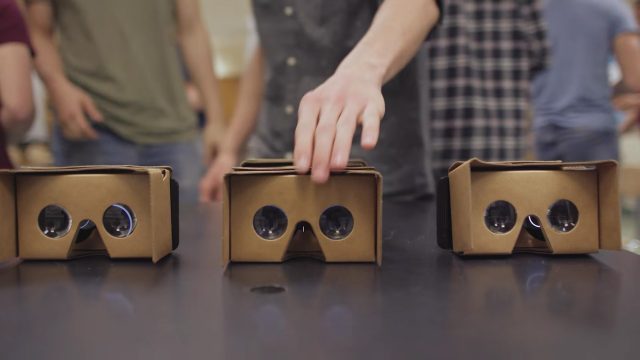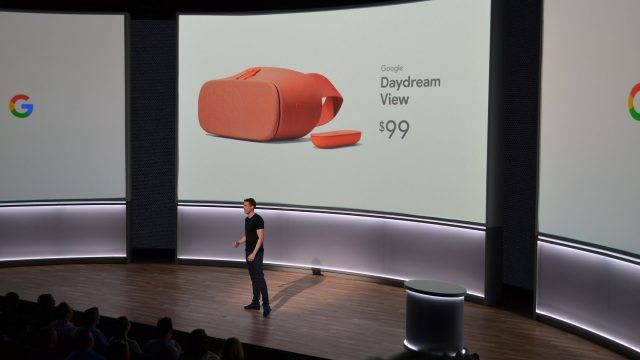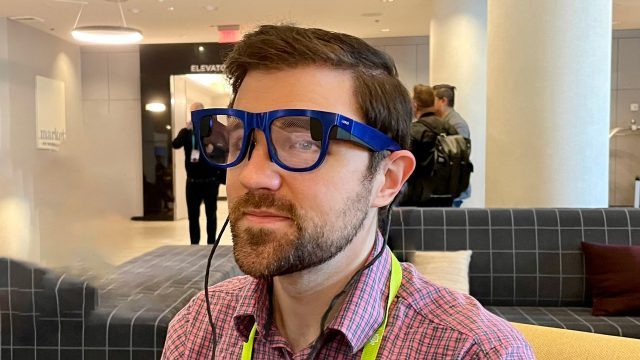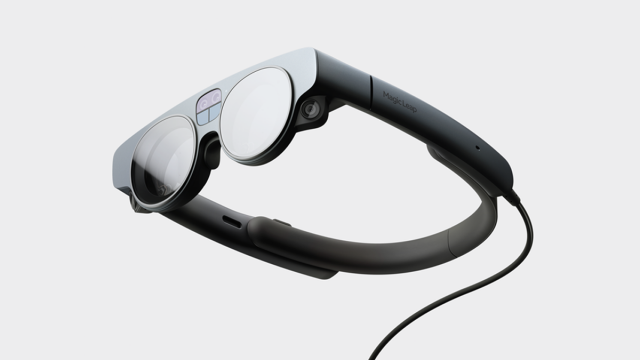Google and Magic Leap today announced a “strategic technology partnership.” The move shows Google seeking to gain ground to keep up with the likes of Meta, Apple, and others in a race to control the AR headset market.
While consume VR headsets have been around for years now, none of the world’s major technology companies have launched consumer-focused AR glasses.
But behind the scenes, companies like Meta, Apple, and Google are racing each other toward that future—one they hope will see all-day AR glasses become as big as the smartphone.
Google has had several starts and stops in the XR space. Google Cardboard was first out the door way back in 2014, and introduced millions to a very basic VR experience made by slapping a smartphone into a cardboard viewer with simple lenses.

The company got more serious with Google Daydream, making a more streamlined experience with phones that were specially certified to work with more advanced smartphone viewers.

And while Daydream ultimately failed, it wasn’t just Google’s fault. The whole concept of VR smartphones viewers just never found a foothold. Meta and Samsung’s similar Gear VR project faced a similar fate. And even Oculus Go—a low cost headset that further streamlined the ‘smartphone VR’ experience by building the smartphone components directly into the headset—couldn’t make the formula work.
Higher fidelity VR, with full tracking and motion controllers, seemed to be the way forward as both PC VR headsets and Meta’s Quest line had shown.
But even those headsets are ultimately stepping stones in the eyes of Google, Meta, and Apple. All are gunning for a future where the reality-altering experience of VR can be merged with the real-world through lightweight AR glasses that people can wear all day.

While Google continues to build out its ARCore software platform (which lets Android developers build phone-based AR apps) Google still eventually needs to get a head-worn AR platform off the ground if it hopes to compete with peers like Meta and Apple, which are already getting a foothold on head-worn AR experiences with devices like Quest 3 and Vision Pro.
Google has made clear that it’s intent on building—or at least supporting—such a device. The company publicly announced last year that it was working with both Samsung and Qualcomm on just that.
If Google wants to leapfrog over the preliminary step of building an MR headset like Meta and Apple, one of the biggest barriers is the challenge of optics. Producing a high-resolution, wide-field of view image through something the size of a pair of glasses is an incredible physics challenge that hasn’t been cracked by anyone just yet.
Optics may be one reason why Google has had starts and stops with its own efforts to build a pair of AR glasses. A major internal project to build such a device, called Project Iris, was reportedly shut down sometime last year.
Such starts and stops have seemingly left Google trailing the others in this race. But the company hasn’t given up yet.
Now its tapping AR headset maker Magic Leap in an effort to secure key technology needed to make a compact AR device. The “multi-faceted, strategic technology partnership” with Google was announced today by Magic Leap, and very specifically calls out optics as being a key driver behind the arrangement.
Shahram Izadi, Vice President and General Manager of AR/XR at Google, said, “We look forward to bringing together Magic Leap’s leadership in optics and manufacturing with our technologies to bring a wider range of immersive experiences to market. By combining efforts, we can foster the future of the XR ecosystem with unique and innovative product offerings.”
Magic Leap Chief Technology Officer, Julie Larson-Green said, “This partnership accelerates the transformative power of AR by combining our extensive optics capabilities with Google’s technologies to continue to advance immersive experiences to the developer ecosystem and for customers. We are looking forward to expanding the potential of XR – blending the physical world with valuable, contextually relevant solutions.”
Magic Leap has had starts and stops of its own. But through the course of the company’s wild fundraising ride, near failure, and eventual stabilization, Magic Leap has amassed a large number of patents relating to XR technology. Their latest headset, Magic Leap 2, also has among the widest field-of-view in a device its size with transparent optics.
And that’s probably where Google’s interests lie.

Whether adopting a more advanced version of the optics in Magic Leap 2, or leaning into a novel solution that’s been developed and patented by Magic Leap, it seems Google is hoping to buy itself a shortcut to market, at least as far as the optics are concerned.
It’s still unclear at this point exactly how this partnership will manifest, but the limited information we have points in a particular direction: Google may be developing its own headset, using Magic Leap’s optics technology, but ultimately the whole headset may be manufactured by Magic Leap.
This would leave Magic Leap to continue its enterprise-focused business while still earning money from the consumer AR space that Google and others are trying to bring to fruition.
And still other strategic plays are possible… Samsung went completely unmentioned in the Google and Magic Leap announcement—where does it fit into this picture? For now only time will tell.
- SEO Powered Content & PR Distribution. Get Amplified Today.
- PlatoData.Network Vertical Generative Ai. Empower Yourself. Access Here.
- PlatoAiStream. Web3 Intelligence. Knowledge Amplified. Access Here.
- PlatoESG. Carbon, CleanTech, Energy, Environment, Solar, Waste Management. Access Here.
- PlatoHealth. Biotech and Clinical Trials Intelligence. Access Here.
- Source: https://www.roadtovr.com/google-partners-with-magic-leap-to-secure-key-tech-for-ar-headsets/
- :has
- :is
- :where
- $UP
- 2014
- 360
- a
- Able
- accelerates
- Adopting
- advance
- advanced
- All
- already
- also
- alt
- amassed
- among
- an
- and
- android
- announced
- anyone
- Apple
- apps
- AR
- AR apps
- AR experiences
- AR Glasses
- AR Headset
- AR platform
- ARE
- around
- arrangement
- AS
- At
- back
- barriers
- basic
- battery
- BE
- become
- been
- behind
- behind the scenes
- being
- Big
- Biggest
- blending
- board
- both
- bring
- Bringing
- build
- Building
- business
- but
- buy
- by
- called
- Calls
- CAN
- capabilities
- Certified
- challenge
- chief
- chief technology officer
- clear
- combining
- compact
- Companies
- company
- Company’s
- compete
- completely
- components
- Compute
- concept
- concerned
- consume
- consumer
- continue
- continues
- control
- Cost
- Course
- cracked
- Customers
- day
- developed
- Developer
- developers
- developing
- device
- Devices
- direction
- directly
- does
- Door
- down
- driver
- each
- Earning
- ecosystem
- effort
- efforts
- Even
- eventual
- eventually
- everything
- exactly
- expanding
- experience
- Experiences
- extensive
- Eyes
- faced
- Failed
- Failure
- far
- fate
- fidelity
- First
- fit
- For
- formula
- Forward
- Foster
- found
- from
- fruition
- full
- Fundraising
- further
- future
- Gain
- Gear
- General
- get
- getting
- given
- Google’s
- got
- Ground
- had
- Have
- Headset
- headsets
- high-resolution
- hope
- hopeful
- hopes
- hoping
- How
- HTTPS
- if
- image
- immersive
- in
- incredible
- information
- innovative
- intent
- interests
- internal
- into
- introduced
- IT
- ITS
- itself
- jpg
- just
- Keep
- Key
- Kind
- large
- Last
- Last Year
- latest
- launched
- Leadership
- Leap
- least
- Leave
- left
- lenses
- Lets
- lie
- lightweight
- like
- likes
- Limited
- Line
- Look
- looking
- Low
- made
- magic
- Magic Leap
- Magic Leap 2
- major
- make
- maker
- Making
- manager
- manufactured
- manufacturing
- many
- Market
- max-width
- May..
- Meta
- millions
- money
- more
- most
- motion
- move
- mr
- MR headset
- Near
- needed
- needs
- never
- no
- None
- novel
- now
- number
- Oculus
- of
- off
- Offerings
- Offers
- Officer
- on
- ONE
- only
- optics
- or
- Other
- Others
- our
- out
- over
- own
- package
- pair
- particular
- partners
- Partnership
- patented
- Patents
- PC
- pc vr
- peers
- People
- phones
- physical
- Physics
- picture
- platform
- plato
- Plato Data Intelligence
- PlatoData
- plays
- Point
- points
- potential
- power
- preliminary
- president
- Pro
- probably
- producing
- Product
- project
- prototype
- qualcomm
- quest
- quest 3
- Race
- range
- real world
- reason
- relevant
- requires
- Ride
- road
- Said
- Samsung
- scenes
- secure
- see
- seeking
- seemed
- seemingly
- seems
- sensors
- serious
- several
- shown
- Shows
- shut
- Shut down
- similar
- Simple
- Size
- small
- smartphone
- smartphones
- Software
- solution
- Solutions
- something
- Space
- specially
- specifically
- starts
- Step
- stepping
- Still
- Stones
- Stops
- Strategic
- streamlined
- such
- tapping
- tech
- Technologies
- Technology
- technology companies
- tell
- that
- The
- The Future
- their
- they
- this
- those
- though?
- Through
- time
- to
- today
- together
- toward
- Tracking
- Trailing
- transformative
- transparent
- trying
- Ultimately
- unique
- unit
- using
- Valuable
- version
- very
- via
- vice
- Vice President
- View
- viewer
- viewers
- vision
- vr
- VR Experience
- VR headsets
- wants
- was
- Way..
- we
- wear
- went
- were
- which
- while
- whole
- why
- wider
- widest
- Wild
- will
- with
- Work
- working
- world
- world’s
- would
- XR
- year
- years
- yet
- zephyrnet







![[Industry Direct] Building a Thriving VR Multiplayer Hero Shooter Game & Community – The Making of 'X8' | Road to VR [Industry Direct] Building a Thriving VR Multiplayer Hero Shooter Game & Community – The Making of 'X8' | Road to VR](http://platoblockchain.com/wp-content/uploads/2023/11/industry-direct-building-a-thriving-vr-multiplayer-hero-shooter-game-community-the-making-of-x8-road-to-vr-300x169.png)





